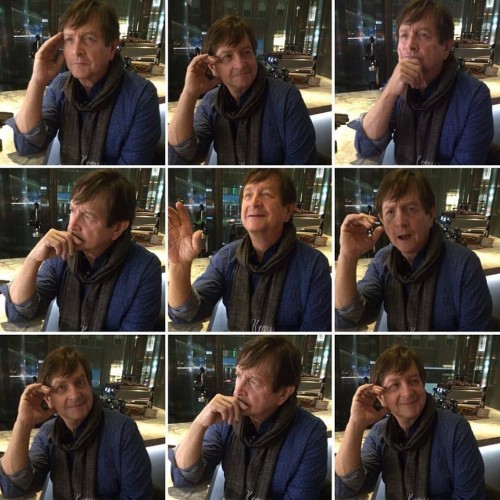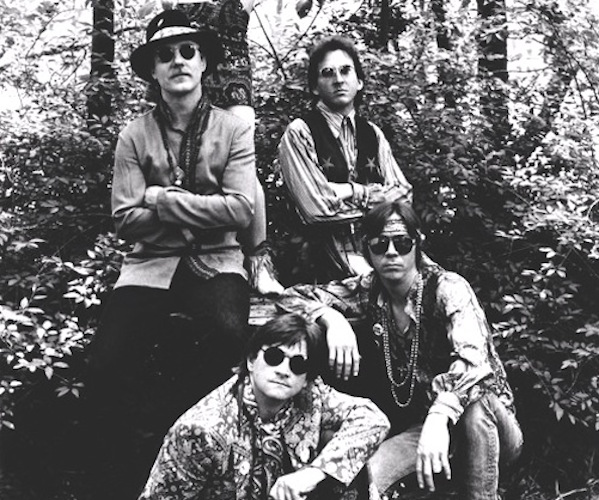Music Interview: Tim Jackson — on Robin Lane, The Band That Time Forgot, Johnny D’s, and the End of an Era
“I hope that these new venues still want to book the occasional seasoned musician, because audiences of all ages still love rock and roll.”

The many faces of of the omni-talented Tim Jackson.
By Matt Hanson and Bill Marx
If The Arts Fuse has a Renaissance man, it is Tim Jackson. Teacher, writer, drummer, film critic, filmmaker — and that only scratches the versatile surface. So it makes perfect sense that as Johnny D’s in Somerville nears its end Tim will be around for two nights of music. On January 15, he will play with Robin Lane and the Chartbusters for its farewell performance (he has been the group’s drummer from the beginning). The evening will also include special guests Laurie Sargent and Ruby Rose Fox, as well as a screening of Tim’s fine documentary about Lane, When Things Go Wrong. The next night Tim will perform with his group The Band That Time Forgot in an evening that will include The Love Dogs. No doubt all in a week’s work for Tim.
Given that this will be the final show for the Chartbusters and that the end of the venerable club Johnny D’s draws near, it made sense to ask Tim a few questions — about The Band That Time Forgot, Robin Lane, and the changing landscape for rock and roll in Boston.
Arts Fuse: How did The Band That Time Forgot get started?
Tim Jackson: After traveling, touring and clubbing for 15 years, I needed to diversify from the routine, change up my life: more learning, kids, new endeavors. I thought of the name first. At the time, the only group paying tribute to music from earlier decades was Sha Na Na. I realized the great musicians with whom I’d worked over the years could have great fun with songs culled from a quirky, lesser-known ’60s repertoire. I called Peter Hoffman first because he could play any style and we’d been in some 3 or 4 groups together. Then Larry Luddecke, who had gotten me into Tom Rush’s band, and Richard Gates, who I had recently begun working with and now is one of the top bass players on call in Boston. We rehearsed two songs a week in Larry’s studio for 5 months, played a friend’s wedding, and the crowd went wild. We won a Best of Boston award within 2 years.
AF: How long have you guys been playing together?
Jackson: 30 years
AF: Who are some of your inspirations/influences?
Jackson: Our approach is to explore the distinct personality as well as the rhythmic and musical details of each song, then make it our own. So it’s not really a cover band, or as I like to say: “We do all original music, we just didn’t write it.” In the ’60s, bands were evolving; each song was a musical experiment. Today, the driving force is the producer’s vision and music is marketed in categories. There is less willingness to experiment, to indulge in naiveté, bravado, or even a lack of musical skill. We take on a wealth of material from A to Z: Animals to Zombies, Nazz to Blues Magoos.

The Band That Time Forgot. Photo: Tim Jackson.
AF:I noticed your featured single is a cover of “Reflections” by The Supremes. What inspired you to do this particular cover?
Jackson: I produced a faux retro show for Somerville Cable TV in 1987 that was called the “Show That Time Forgot.” The program was a bit weird for cable at the time. We decided to also do a retro 45rpm record inspired by a psychedelic theme. Then we were asked by John Sayles and Mason Daring to play some ambient music on the film City of Hope, for which we were kindly given credit. Then, when the producers of a record called BoTown does Motown asked for a contribution, Peter said let’s go psychedelic, so we chose that song. Rather than imitating the Supremes original, we covered the vocals and meticulously reproduced the musical parts as though they were being done by The Grass Roots. Last week I finally threw together a mash-up video of the song to revive it before our gig on January 16th.
AF: Johnny D’s is closing its doors next month. What does it feel like to be playing at the end of a beloved local venue’s long run?
Jackson: We will really miss Johnny D’s. We go back to clubs like Jack’s, The Oxford Ale House, Gladstones, Brandys, Nightstage, The Tam, Bunratty’s, Harpers Ferry, Inman Square Men’s Bar, Jonathan Swift’s. We played them all, and Johnny D’s is one of the last of those old school clubs.
Carla (Johnny D’s owner) laughs about how when the club was trying to change its image 30 years ago she called me and asked us [The Band that Time Forgot] to please play there because we were beginning to draw huge crowds elsewhere. There was a decade or so when we didn’t play at Johnny D’s much because they had outgrown us. Playing at Johnny D’s over the last few years has become wildly successful: we have a real soft spot for the club, for Carla, and Dana, who does sound. We started playing shows at an earlier time (at Carla’s suggestion). At first we scorned the change. But our crowd is now 50 plus and they don’t party late. Their kids are grown — sometimes they come along to hear us with their parents. It’s a very funny dynamic — a younger crowd is discovering (or in some cases rediscovering) us.
Robin Lane and The Chartbusters. Photo: Paul McAlpine.
AF: Talk about your documentary on Robin Lane — and the breakup of The Chartbusters. Is this about an era ending?
Jackson: Robin and the band go back about 40 years. Robin writes differently now. Coming out and performing with the Chartbusters is fun, but I, for one, am not nostalgic. I love the guys in the band. We’re like brothers; Robin is the sister I never had. For better or worse. Asa (Brebner) is a great talent, as are the guitarists we have added, Billy Loosidian and Pat Wallace. What’s ending is our having to be “The Chartbusters.” We will still play together.
The movie took five years to make and Robin and I are closer than we ever were on the road. The film was a huge treasure hunt for material. We traveled all over, argued, laughed, and tortured each other endlessly. When Things Go Wrong won Best Documentary at the New Jersey International Film Festival. That’s small reward for a lot of work, but the film provided huge closure for me and for her, I think. Robin was very candid in the film about her life.
We are hardly ending any era but our own.
AF: What do you think the next successful venue for the Boston rock scene might be?
Jackson: There are so many new clubs out there; it’s just the landscape that’s changed. New players, great players are everywhere. The Chartbusters performed when the scene was very different than when The Band Time Forgot arrived: The Rat, The Channel, The Space, The Paradise, Jasper’s, Jumpin’ Jack Flash, Sir Morgan’s Cove. I hope that these new venues still want to book the occasional seasoned musician, because audiences of all ages still love rock and roll.
Matt Hanson is a critic for The Arts Fuse living outside Boston. His writing has appeared in The Millions, 3QuarksDaily, and Flak Magazine (RIP), where he was a staff writer. He blogs about movies and culture for LoveMoneyClothes. His poetry chapbook was published by Rhinologic Press.
Tagged: Johnny D's, Matt Hanson, Robin Lane, Robin Lane and the Chartbusters, The Band Time Forgot

